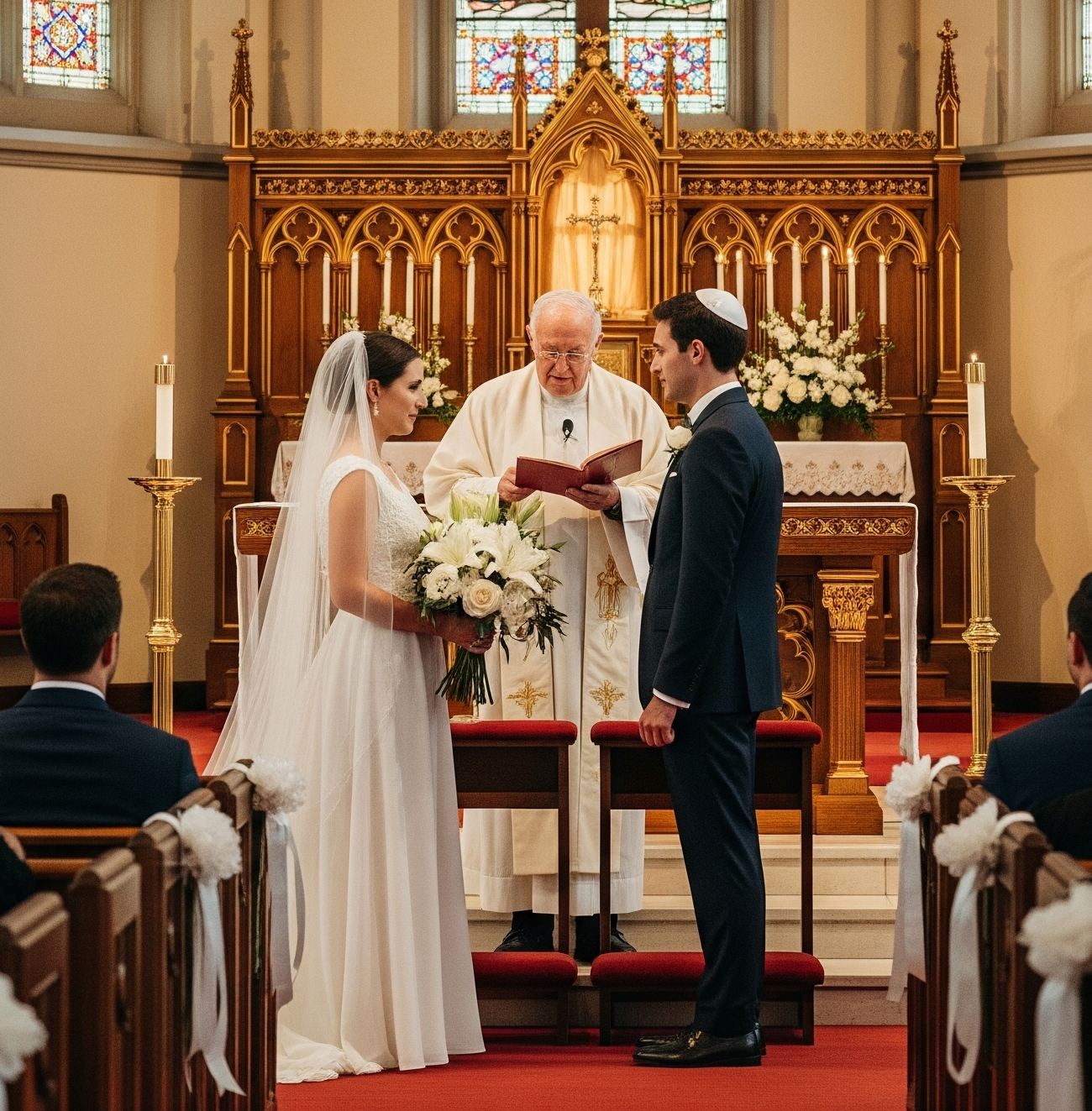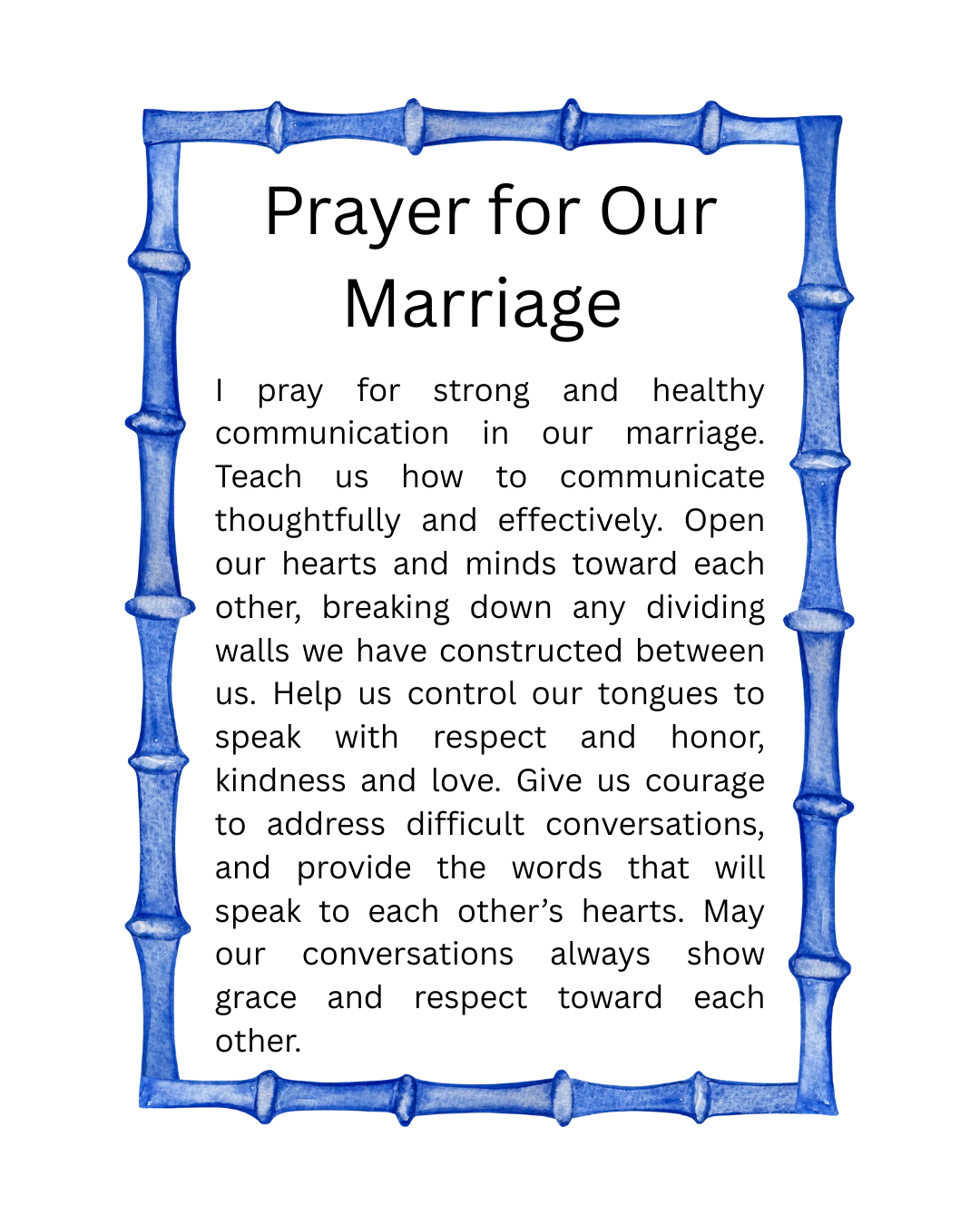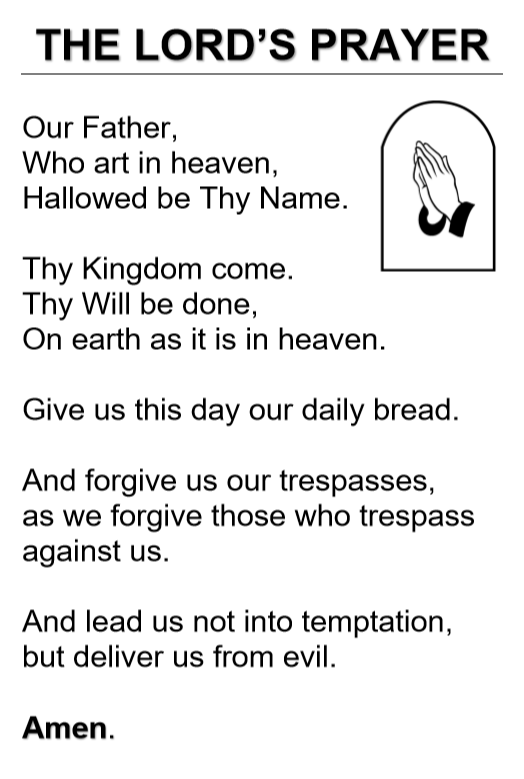-
-
Interfaith MarriageOffice of Marriage and FamilyAn interfaith marriage brings both unique opportunities and challenges. But with respect, honest communication, and a commitment to shared values, your love can deepen and flourish.
Ten Essential Conversations for an Interfaith Couple
-
-
Information for CouplesInterfaith Marriage
-
-
Every valid marriage between two baptized people is a sacrament or sacramental marriage, that is, an outward sign, instituted by Christ, that gives grace. This is because in baptism we are specially conformed to Christ. When one person who is conformed to Christ in baptism is joined in marriage with another person who is conformed to Christ in baptism, the couple by that fact becomes a sacramental image of Christ and His body, the Church, and their marriage is a source of sacramental grace. This is the case even when one of the spouses, though baptized, is not a Catholic.
For an interfaith marriage to be valid, the Catholic spouse must receive special permission from their pastor to marry, and normally, the couple must marry in front of a Catholic minister. The ceremony is to be celebrated in the most suitable place—the parish church of either the Catholic man or the Catholic woman. Any questions or concerns should be addressed with the pastor preparing the couple for marriage.
When a baptized person marries an unbaptized person, though it is still a good and valid natural marriage, it is not a sacrament—not a sacramental image of Christ and the Church, and not a source of sacramental grace. For a Catholic to validly marry someone who is not baptized, a special dispensation from the local bishop is required, and normally, the couple must marry in front of a Catholic minister.
All valid marriages, whether sacramental or not, are marked by the essential properties of unity and indissolubility. In both, the Catholic spouse promises to baptize and raise any children in the Catholic faith. The couple must be free to marry and agree to the permanent, faithful, and fruitful bond of marriage. These topics should be discussed openly and practically early on in the relationship. Lastly, the couple would participate in Catholic marriage preparation before exchanging their vows.
Looking for more general information about the Catholic Church's teachings on marriage?
Check out this Q&A
-
-
-
Love and respect are the foundation of a healthy marriage, especially in an interfaith marriage. The Catholic spouse must not give up their faith, but should also avoid harshness or pressure toward their non-Catholic spouse in respect to the practice of their faith.
Dialogue should be respectful and always remain open. By showing respect, the Catholic party gives good witness, strengthens their own faith, and creates a home where faith and love can flourish.
-
-
-
Attending Mass each Sunday is a serious obligation and great privilege for Catholics. Talk honestly about how this will work in your marriage, especially if the non-Catholic spouse also attends a different service.
Couples are strongly encouraged to find ways to pray together — even something as simple as grace before meals, the Lord’s Prayer, spontaneous prayers of thanksgiving for blessings received, or a shared moment of silent prayer. These habits create unity without forcing uniformity.
-
-
-
The Catholic spouse must make a solemn promise before God and the Church to do all in their power to raise children in the Catholic faith. This is not optional. Couples should discuss how Baptism, First Communion, Confirmation, and Catholic formation will be handled. While the non-Catholic spouse does not need to make the same promise, they must agree not to obstruct the Catholic spouse in fulfilling it.
The religious education of children in the Catholic faith can be a particularly difficult issue. Both the husband and wife are bound by this parental responsibility and must not ignore it or any of its connected obligations. However, the non-Catholic spouse can alleviate some difficulties by showing support and participating in the educational efforts in ways their conscience allows.
-
-
-
For many couples, the holidays highlight religious differences. Christmas, Easter, and other holy days of obligation may be celebrated differently or even with different meanings. Couples should plan ahead how they will celebrate as a family, ensuring that Catholic holy days are respected.
Shared traditions — such as lighting Advent candles or serving at a soup kitchen together — can help unite the family while honoring both backgrounds.
-
-
-
Extended family may bring pressure, questions, or expectations about religious practice, especially regarding weddings, baptisms, and holidays. Couples should speak together beforehand about how to handle these situations as a united team. Respecting family traditions while maintaining your own unity as husband and wife is key.
-
-
-
Catholic teaching insists that no one should be coerced in matters of faith. Neither spouse should pressure the other to convert or block them from living their faith. A healthy interfaith marriage creates space for both spouses to be sincere about their beliefs, while allowing the Catholic to fully practice the faith and lead the children in it.
-
-
-
Interfaith marriages often demand extra patience and understanding. The virtues of humility, charity, and forgiveness are not optional but essential. Couples should work on strong communication skills, listening with empathy, and resolving conflict gently. These habits help prevent faith differences from turning into deeper relational divides.
Book recommendation:
Back to Virtue: Traditional Moral Wisdom for Modern Moral Confusion by Peter Kreeft
-
-
-
The Catholic spouse should be rooted in their faith, supported by their parish, and encouraged to grow in prayer, study, and the sacramental life.
A strong Catholic witness does not mean pushing religion on the non-Catholic spouse, but rather living a joyful, loving, consistent example. The shared moral values — such as honesty, justice, and love — can become common ground for unity in marriage.
If you have questions about your Catholic faith or struggle to explain why we believe what we believe, consider listening to Fr. Mike Schmitz's Catechism in a Year podcast (below), scheduling a meeting with your parish priest to get some answers, or by going to catholic.com and entering your question in the search box!
-
-
-
The Church recognizes that interfaith marriages carry unique challenges, which is why pastoral support is so important. Priests, deacons, and lay ministers are here to guide you in preparation, in living your marriage, and in raising your family in the faith. The Church encourages interfaith couples to remain connected to their Catholic parish, seek spiritual direction when needed, and draw strength from the parish's community of believers.
-
-
-
Stories from CouplesInterfaith Marriage
-
The Road Less Traveled: A Marriage of Two Faith Traditions
When Amber and Stephen were married, both were Protestant, having first crossed paths in the halls of their Baptist youth group. But as time went on, Amber felt the nudge to take the Catholic faith more seriously. She attended RCIA classes and was eventually received into the Catholic Church. In this article, hear from Amber as she offers her experience and what she has learned navigating an interfaith marriage.
Read Their Story
-
-
Media ResourcesInterfaith Marriage
-
Ask Fr. JoshIn this episode of the "Ask Fr. Josh" podcast, Fr. Josh Johnson offers advice to a listener who has questions about interfaith dating and marriage, noting that her Catholic faith is very important to her, but she finds herself attracted to men who are not Catholic.
Learn More
-
-
-
Catechism in a YearFr. Mike Schmitz explores the entire Catechism of the Catholic Church over the course of 365 days in "The Catechism in a Year" podcast, helping listeners understand the essentials of the Catholic Faith and why the Church's teachings matter.
Learn More
-
-
Suggested Prayers for CouplesInterfaith Marriage
-
-
ContactInterfaith Marriage
-
-
 Amy Klarkowskiamy.klarkowskimadisondiocese.orgPre-Petition Case Advisor, Civil Marriage Initiative Coordinator & Divorce Ministry Coordinator
Amy Klarkowskiamy.klarkowskimadisondiocese.orgPre-Petition Case Advisor, Civil Marriage Initiative Coordinator & Divorce Ministry Coordinator
-
-





